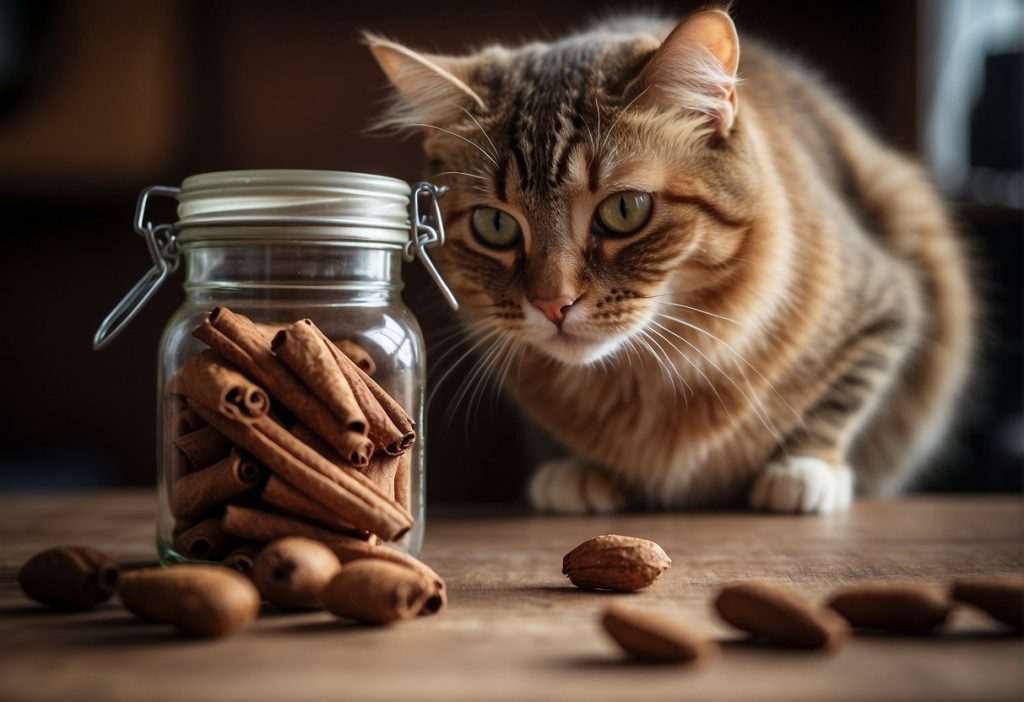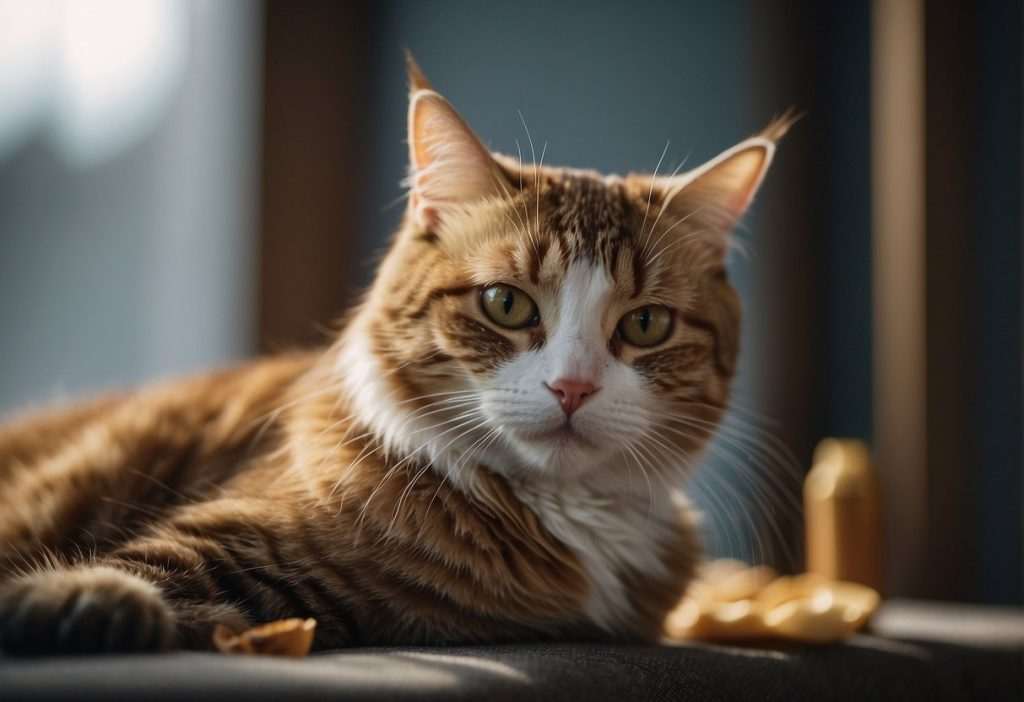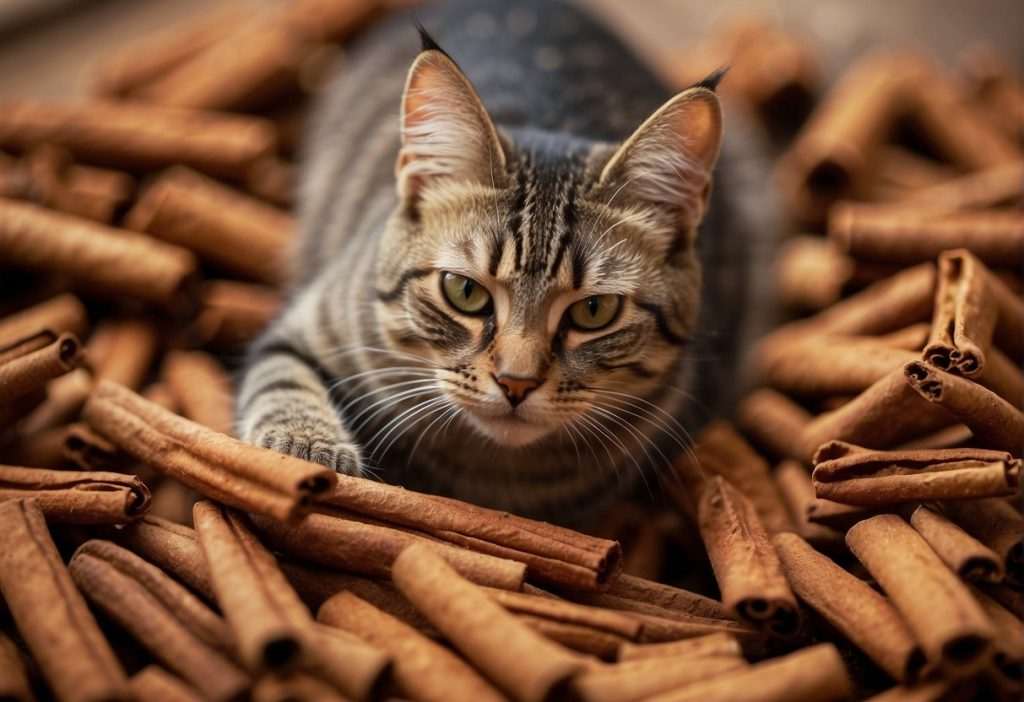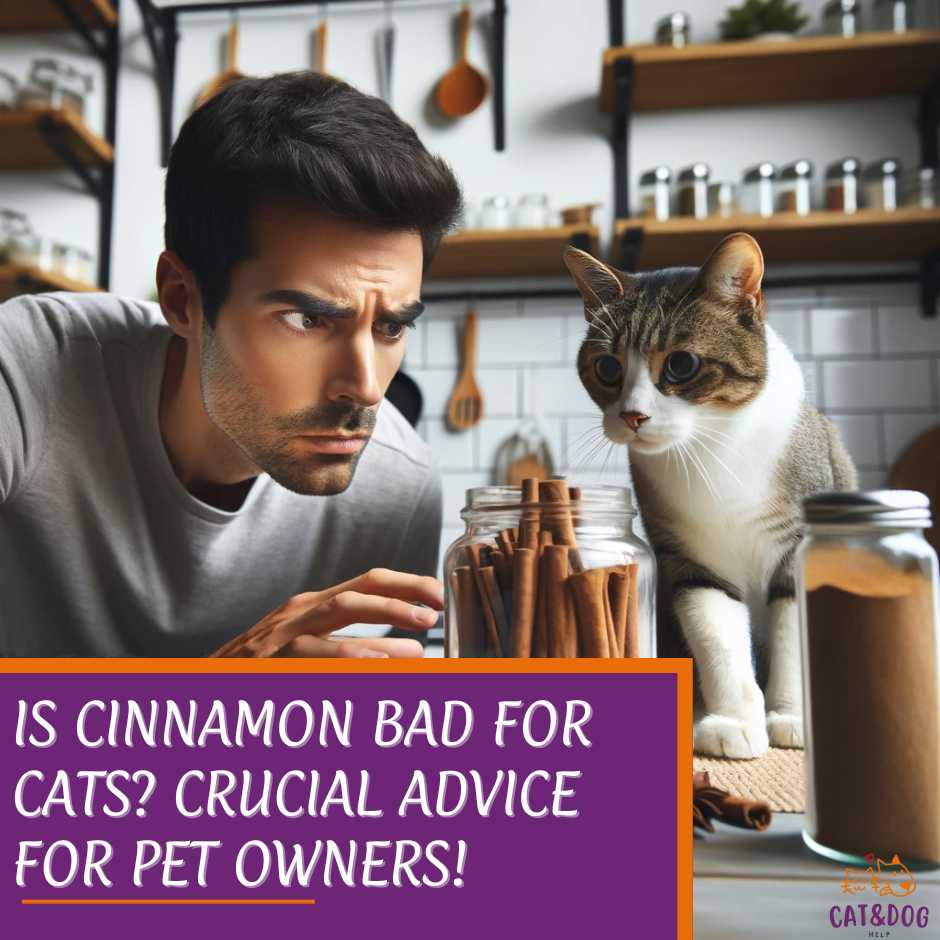As a cat owner, you might wonder about the safety and health benefits of various household spices when it comes to your furry friend.
Have you ever thought about cinnamon?
It’s a common spice used in everything from desserts to savory dishes and even in natural cleaning products.
But hold on, is it safe for your whiskered companion?
Are there any health benefits for cats? Is cinnamon used in commercial cat food or human food?
Believe it or not, cinnamon can be problematic for your feline pal, leading to health issues if they’re overexposed over a long time.

Cinnamon’s warm, sweet aroma is tempting to us, but it’s a whole different story for cats. While a sprinkle here and there may not be an immediate cause for alarm, it’s crucial to understand the risks it poses to cats.
Although the ASPCA Animal Poison Control Center doesn’t consider cinnamon toxic for cats, there are a couple of reasons why cats are particularly susceptible to problems if they eat cinnamon.
Cats lack the liver enzyme (glucuronyl transferase) that is needed to break down cinnamon, which means it builds up in the bloodstream.
Key Takeaways
- Cinnamon can cause health issues in cats if ingested in significant amounts.
- It’s important to be aware of the signs of cinnamon toxicity in cats.
- Preventing your cat’s exposure to cinnamon can help keep them safe.
Is Cinnamon Bad for Cats?
Nutritional Profile of Cinnamon
Have you ever wondered what makes cinnamon tick? It’s not just a fragrant addition to your pumpkin spice latte; it’s a complex spice.
At its core, cinnamon is packed with compounds where coumarin stands out—a substance that’s fine for you but could spell trouble for your furry friend in larger amounts, specifically higher levels. (1)
There are two types of cinnamon: cassia cinnamon, commonly used in North America and Ceylon cinnamon. (2)
Cassia cinnamon, which contains higher levels of coumarin than Ceylon cinnamon, is commonly used in North America. (3)
Additionally, cinnamon has been shown to regulate blood sugar levels and improve insulin sensitivity, making it a good option for diabetic dogs.
Potential Risks and Toxicity Levels
Speaking of trouble, let’s talk toxicity. Sure, cinnamon smells delightful, but for your cat, it’s not always the treat you might think. You see, cats are a lot smaller than us and what’s minor to you can be major for them.
- Cinnamon Toxicity in Cats: A BreakdownLarge Amounts: Can lead to liver issues because of coumarin.
- Symptoms: Diarrhea, vomiting, weakness, and a rapid heart rate.
Here’s where it hits home: a case study found cinnamon can cause toxicity in cats.
Imagine you, by accident, left a cinnamon-heavy dessert where your cat could paw at it—they could end up with a serious case of tummy trouble or worse.
You might now be eyeing that cinnamon shaker with suspicion, wondering if a tiny sprinkle spells disaster. Remember, moderation is key.
Think of that cat of yours like a tiny, four-legged connoisseur—exposure should be minimal, accidental taste, not a dietary staple.
Did you know that despite the risks, the ASPCA hasn’t classified cinnamon as outright toxic for cats? It’s a gray area.
Treat cinnamon like you would any houseplant you’re not too sure about—better safe than sorry, right? Keep your spice jars out of reach and your kitty’s diet simple and cat-friendly.
In understanding cinnamon’s impact on cats, pet owners must avoid toxic ingredients, reinforcing the importance of selecting safe, cat-friendly foods and spices for your furry friends.
Remember, their safety is well worth the extra caution!
Understanding Cinnamon’s Impact on Cats
Hey, have you ever wondered if that dash of cinnamon compounds might be more than your kitty can handle?
Well, it’s a good question to ask since your furball’s body ticks differently than ours. Cats can’t metabolize cinnamon compounds like we do due to a lack of certain liver enzymes.
That means that cinnamon compounds, although a delightful spice for us, can be a real tummy twister for your cat’s body, potentially leading to indigestion.
Understanding Cinnamon’s Impact on Cats’ body is important for their health and well-being.
Now, before you freak out about your cat’s brush with your cinnamon toast, it’s not just the ingestion—cinnamon oil can be a sneaky culprit, too.
Essential oils are way stronger and a no-go for cats. Exposure to concentrated forms, like those found in essential oils, can cause some nasty symptoms.
So what should you look out for? Here’s a quick checklist:
- Coughing or wheezing
- A fit of sneezing
- Skin irritation if cinnamon has made contact (4)
It’s not just a sneeze here and there—symptoms of cinnamon toxicity from cinnamon ingestion can escalate to full-on allergic reactions or toxicity. (5)
Cinnamon has coumarin, and in high doses, this compound can be a blood thinner, which isn’t something you’d want to mess with for your feline friend.
Your vigilant eye on these reactions can keep your pet safe and hale, and vitamin K therapy, which is used as an antidote for coumarin poisoning, may be useful if symptoms of cinnamon toxicity. (6)
Including vomiting, diarrhea, a change in heart rate, breathlessness, low blood sugar levels, blood thinning, liver disease, and organ failure are occurring.
If your pet is in respiratory distress due to inhalation or ingestion of cinnamon, airway management, and oxygen therapy will be used as appropriate.
Remember, your cat’s liver is pretty darn important for filtering out the bad stuff, and if it can’t deal with cinnamon, you could be looking at some serious health trouble.
In short, while you savor that cinnamon roll, let’s keep it out of paw’s reach, shall we? Your cat has plenty of treats that are far better suited for their unique little systems.
Keep those whiskers twitching in health, not in response to Mr. Cinnamon!
In-Depth Analysis of Cinnamon Toxicity
Ever wondered if that spoonful of cinnamon can be troublesome for your feline friends? Let’s dig into the nitty-gritty.
Cinnamon, while not classified as toxic by the ASPCA, can certainly cause some unwelcome health issues in cats.
Long-term Effects of Cinnamon Exposure
Imagine your cat having a secret stash of cinnamon—sounds harmless, right?
But over time, a little pinch here and there could lead to more than a spicy mishap. Experts suggest that prolonged exposure might result in:
- Decreased blood sugar: Too much of this sweet spice could drop your kitty’s blood sugar levels, causing lethargy or more serious conditions.
- Liver issues: Just as with humans, a cat’s liver processes everything they ingest, and too much cinnamon can lead to liver complications. (7)
Expert Insights and Veterinary Opinions
Now, what do the pros say? Veterinary toxicologists raise a red flag when it comes to oils and potent forms of cinnamon. Here’s the scoop:
- Digestive distress: Symptoms like vomiting or diarrhea can be a red flag. These are clear indicators that your cat’s body is saying a big ‘no thanks’ to cinnamon. (8)
- Respiratory irritation: Cats have sensitive airways, so inhaling cinnamon dust could cause coughing or other respiratory trouble.
| Form of Exposure | Potential Risk |
| Powdered Cinnamon | Inhalation risk, mild GI upset |
| Cinnamon Sticks | Low risk; hard to ingest |
| Cinnamon Oil | High risk; toxic in small doses |
Remember, your cat’s curiosity could lead them into spice-laden territories. It’s best to keep cinnamon and any new food, such as cinnamon, out of paw’s reach.
If your whiskered pal does get into some spicy trouble, don’t hesitate to consult your vet. After all, it’s better to be safe than sorry when it’s about the health of our furry companions and prioritize your pet’s health.
If they require veterinary care related to eating any unsafe foods, pet insurance can help cover the cost of treatment.
Comprehensive Preventive Measures

Ever wondered if that heavenly scent of cinnamon could be a no-go for your whiskered friend?
Turns out, it’s wise to play it safe when it comes to cats and this cozy spice. Let’s sniff out some strategies to keep your kitty out of cinnamon’s way!
Advanced Safety Guidelines Have you noticed how cats are curious creatures, always on the prowl for something new?
Here are some tips to ensure cinnamon and its enticing aroma remain out of paw’s reach:
- Store Spices Securely: A simple “keep out” sign won’t work with your cat. Instead, choose high cabinets or spice racks with doors to store cinnamon and similar substances.
- Clean Spills Immediately: If you spill any cinnamon while cooking, be like a ninja—clean it up quickly, before your feline friend can investigate.
- Diffuser Diligence: Love using essential oils? Remember, diffusers with cinnamon oil should be used in rooms your cat cannot access. It’s like setting up a VIP zone for your cat’s safety!
Alternative Safe Foods and Spices Now, don’t get your whiskers in a twist, there are plenty of safe alternatives to share with your cat. Check out this list of cat-friendly goodies:
- Cooked Meat: Chicken or turkey, unseasoned please!
- Cooked Carrots: A nibble can be nice, but only in small amounts.
- Catnip: For obvious reasons, right?
Remember, always serve these in moderation and ensure they are safe and appropriate for your specific cat’s diet supplements and health status. No one knows your furry friend better than you!
In a nutshell: Cinnamon and cats? It’s better to keep them apart.
Your feline pal may not be able to enjoy a cinnamon roll, but they sure will love the safety and care you provide. Keep it up, superstar cat parent!
Immediate and Long-Term Care Post-Ingestion

First Aid and Immediate Response
Has your curious kitty gotten into some cinnamon? No need to panic—just follow these quick steps to help your furry friend:
- Identify Symptoms:
- Check for vomiting, drooling, diarrhea, coughing, sneezing, or difficulty breathing.
- Minimize Further Ingestion:
- Remove any cinnamon product from your cat’s reach.
- Offer Fresh Water:
- Provide plenty of clean water to drink.
- Stay Calm and Comfort Your Cat:
- Keeping yourself and your cat calm can prevent additional stress.
- Contact Your Vet:
- Time is of the essence. Call your vet or pet poison control immediately for advice.
Professional Veterinary Care and Aftercare
Once you reach the vet, they’ll assess the situation. Here’s what might happen next:
- Gastric Lavage: A gastric lavage might be in the cards to cleanse your cat’s system.
- Fluid Therapy: To prevent dehydration from vomiting or diarrhea, your vet may administer IV fluids.
- Monitoring: Keep an eagle eye on your cat over the next few days for any lingering symptoms.
Remember, your cat depends on you to keep them safe. While cinnamon’s scent might charm you during the holidays or baking sessions, it’s a no-no for your cat.
Store your spices out of paws’ reach and always check with your vet if you suspect your cat has eaten a large amount of something they shouldn’t have, such as cinnamon powder.
Your quick thinking can make all the difference for your four-legged family member! In case of an allergic reaction, prompt treatment at the vet is essential.
For skin reactions, the affected area is thoroughly washed with water and mild soap or detergent to remove the irritant.
The skin might then be treated with soothing ointments and antibiotics.
If there is an allergic reaction in the oral cavity, the vet may recommend additional treatments to alleviate symptoms and prevent further complications.
Quick Recap

Hey there, let’s quickly brush up on why cinnamon might not be your cat’s best friend. Have you ever wondered if that delicious-smelling spice could be a no-no for kitty?
Well, the answer leans towards caution.
- Potential Risks:
- Allergic Reactions: Some cats may show signs of an allergy.
- Toxicity Symptoms: These can range from vomiting to decreased blood sugar levels.
- Types of Cinnamon: It can come in sticks, powder, oils, or even as part of plants.
Wondering about the maximum safe amount? It’s tricky because cats are curious, but even a small amount could cause trouble. So, better safe than sorry, right?
Recall that sniff of comfort from your cinnamon latte? Cats have super-sensitive noses, so the strong scent alone might be overpowering for them.
And if your furry pal decides to have a taste… well, that’s where the concern comes in.
Remember:
- Immediate Attention: If your cat ingests cinnamon, you need to act swiftly.
- Vet Visit: Better get a professional’s advice to ensure your pet stays healthy.
Your vigilance is key in keeping your whiskered companion out of harm’s way. Although the risk of a serious problem is low, why take the chance? Keep those cinnamon treats out of paws’ reach!
We’ve covered the essentials without diving too deep. But keep those ears perked for more anecdotes and advice on keeping your feline friend purring and healthy.
Stay informed and stay cautious – your cat counts on you!
Frequently Asked Questions
Navigating the world of pet health can be like deciphering a fur-covered puzzle, but don’t worry! We’ve got some straight talk on cinnamon and cats that’ll help you keep your whiskery pal safe.
What potential risks exist for a cat that consumes cinnamon?
Cinnamon contains compounds that can be harmful to cats if ingested in significant quantities.
Your feline friend doesn’t possess the proper enzymes to break down these elements, which raises the risk of liver toxicity or other health issues.
How can I tell if my cat has a cinnamon allergy?
An allergic reaction to cinnamon might manifest as coughing, wheezing, or difficulty breathing.
Skin irritation is also possible, showing redness or itchiness. Keep an eye on your kitty for any unusual symptoms after exposure.
Is cinnamon oil more dangerous than powdered cinnamon for cats?
Yes, cinnamon oil is much more concentrated than its powdered counterpart, making it exceptionally dangerous for your curious cat.
Even a small amount can cause a rapid reaction, so it’s best to keep it out of paw’s reach.
Can a small amount of cinnamon cause harm to kittens?
Kittens are more sensitive due to their small size and underdeveloped liver, making them particularly vulnerable to any cinnamon, even tiny amounts. It’s better to err on the side of caution and prevent any exposure.
What immediate steps should I take if my cat ingests cinnamon?
If you suspect your little prowler has gotten into the cinnamon, it’s important to act swiftly.
Remove any remaining cinnamon from reach and observe your cat for any signs of distress. Contact your vet at once if you notice any troubling signs.
Are any breeds of cats more susceptible to cinnamon toxicity?
There’s no evidence to suggest that specific cat breeds are more prone to cinnamon toxicity.
However, all cats can potentially be affected due to their general inability to metabolize cinnamon and its compounds efficiently. Keep your guard up regardless of breed.


